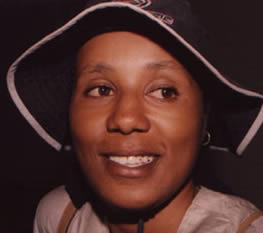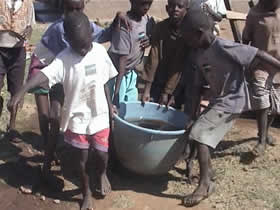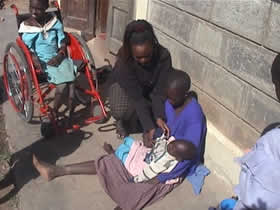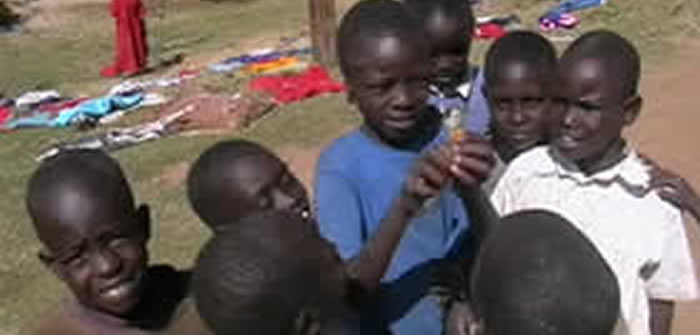 Born in Kenya on 1982, Hawa Noor is Camerawoman and Filmmaker who graduated from Mass Communication and Journalism at the Islamic University of Uganda in 2004. She started her internship in Press field and later worked as Camerawoman at the local TV station “Citizen”.
Born in Kenya on 1982, Hawa Noor is Camerawoman and Filmmaker who graduated from Mass Communication and Journalism at the Islamic University of Uganda in 2004. She started her internship in Press field and later worked as Camerawoman at the local TV station “Citizen”.
Since 2004, she is working at NTV Station belongs to the Nation Media Group in Nairobi. Her last film “The Unspoken Samburu Handicapped Kids” is a short documentary shot in February 2006 in Kenya.
Shohreh Jandaghian– Could you explain a bit about the theme you have chosen for your documentary?
Hawa Noor– This is a feature documentary regarding the Samburu community who value livestock better than human beings. Their lifestyle involves moving from one Place to another in search for pasture. Their land is not fertile enough for agriculture and their greatest asset is livestock, which is their reason for living. This is the extent this community values animals-such that nothing can separate them.
If you come to Kenya today, I guarantee you won’t meet any handicapped Samburu adult because all of them were killed at tender ages. This culture has been practised for so long that it is done to date. It is a burden to them to cater for livestock, at the same time carry a handicapped child around. So as they prepare to move, they also prepare holes and ropes, to which they abandon their disabled kids or tether them and leave them for the dead.
Grace Seneiya, a Samburu middle aged lady is the saviour of those children, having herself escaped a forced marriage at the age of 19. She has worked tirelessly to make sure those children’s rights are given priority. She has set up a centre in Maralal town where she keeps the rescued children. She has fought hard with the community who strongly oppose her efforts. In her centre, you meet all types of disabilities, but all of them can afford a smile.
Maralal is about 600 kilometres from Nakuru and so I Organised myself carefully and set off for the work. I did it around February 2006 and it was given airtime in a local language programme called Taswiraya Jamii (the picture of the society).
Shohreh– How did you know about this theme?
Hawa– I had a chat with a friend who is Samburu and the topic came up when I decided it was a nice idea for a feature. I like doing human-interest features and environmental issues.
Shohreh– Are there many Kenyan women working in film business?
Hawa– Here in Africa, women suffer inequality in film business even though there are a sizable number of women in the film industry; it can never be compared to  that of men. There is this stigma about family commitment and many women fear jobs that occupy much of their time. They are more worried about family stuff.
that of men. There is this stigma about family commitment and many women fear jobs that occupy much of their time. They are more worried about family stuff.
Another issue is about the continent’s history- women in Africa believe it’s a woman’s duty to take care of the home – so this does not leave room for complicated” types of work like Filmmaking. It’s also believed that film/journalism is a man’s job and women who do them have/will have marriage problems-because they have no time for their husbands and children- so they tend to keep off.
Shohreh– What are your experiences as a female cinematographer working in a traditionally male-dominated area?
Hawa– It’s competitive, and most of the time I believe that preference is given to women filmmakers, maybe because we’re a minority in that field.
Shohreh– Which camera and shooting equipments do you work with normally?
Hawa– I use digital MiniDV cameras. Currently I use PD 150. Apart from natural lighting, I use artificial (daylight & tungsten) lights.
Shohreh– Which directors in particular do you admire and would like to work with as Camerawoman?
Hawa– I’d love to work with Albert Wandago & Dommie Yambo-Odotte. Internationally, I admire Steven Spielberg.
Shohreh– How do you see the state of filmmaking in Kenya, as a young filmmaker? 
Hawa– It has a bright future because many enthusiastic young filmmakers have gained interest in making movies. There are so many young filmmakers coming up but I would like to stress that in the film industry, creativity is more important compared to the issue of moneymaking. Many people start filming because they want to make a living. But the very important issue is professionalism.
Shohreh- You work also as news reporter. Could you tell a bit about your journalistic life?
Hawa– My reporting career is crazy! Very little time to do anything for myself hence some important documentaries have to be delayed because my editor needs a story done. Basically, I prefer features to news stories because you get more credit in the former.
Shohreh– What are you working on next?
Hawa– I am working on an environmental feature. That has to do with negative environmental impacts like deforestation, which is dangerous for the Lake Nakuru in National Park. This park is famous for its flamingos and is one of the main revenue earners for the country. The destruction of forests and harmful agricultural practises have a very negative impact on the lake and so slowly the lake is disappearing. If things don’t change, the lake will not be there in 8 years!
Shohreh– Thanks so much Hawa, for taking the time to share your ideas.
Hawa– My pleasure.
Photos from Hawa Noor

